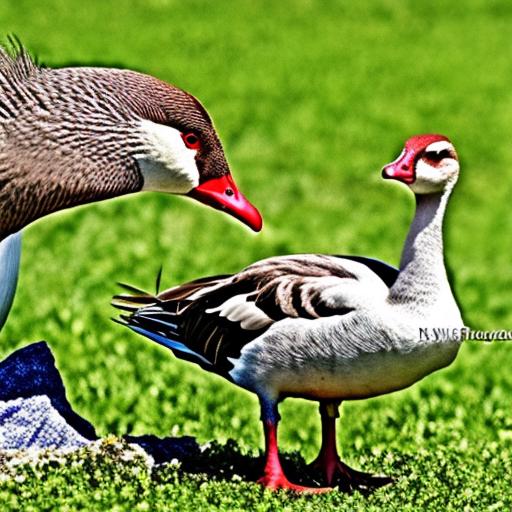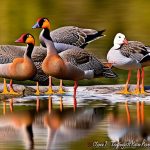Geese invading yards can be a frustrating problem for homeowners. These birds can cause damage to lawns, gardens, and property, and their droppings can create unsightly messes. In order to effectively control geese and prevent them from invading your yard, it is important to understand their behavior and implement appropriate control methods. This post will discuss various approaches to geese control, including installing physical barriers, implementing landscaping techniques, using decoys and scare tactics, creating a designated feeding area, removing potential food sources, utilizing sound and light deterrents, enlisting the help of a professional, consistently maintaining your yard, and understanding the legal regulations surrounding geese control.
Key Takeaways
- Geese are social animals that prefer to stay in groups and are attracted to open spaces with water and food sources.
- Physical barriers such as fences, netting, and hedges can prevent geese from entering your yard.
- Landscaping techniques such as planting tall grasses and shrubs can make your yard less attractive to geese.
- Decoys, scarecrows, and noise-making devices can be effective in deterring geese from your yard.
- Creating a designated feeding area away from your yard can lure geese away from your property.
Understanding the behavior of geese
Geese are social birds that often travel in large flocks. They are attracted to yards because they provide open spaces for grazing and nesting sites near water sources. Geese are herbivores and feed on grasses, plants, and grains. They have a strong homing instinct and tend to return to the same areas year after year. Understanding these behaviors can help in developing effective control strategies.
Installing physical barriers to prevent geese from entering your yard
One approach to controlling geese is to install physical barriers that prevent them from entering your yard. Fences can be effective in keeping geese out, but they need to be at least three feet high and have no gaps or openings that geese can squeeze through. Netting can also be used to cover areas where geese are likely to land or graze. It is important to properly install and maintain these barriers to ensure their effectiveness. Regular inspections should be conducted to check for any damage or gaps that may allow geese to enter.
Implementing landscaping techniques to deter geese
Another approach to controlling geese is through landscaping techniques that discourage them from entering your yard. Geese are attracted to open spaces, so planting dense shrubs or tall grasses can make your yard less appealing to them. Adding rocks or gravel to areas where geese tend to congregate can also deter them, as they prefer grassy areas for grazing. Additionally, using motion-activated sprinklers or other devices that create noise or movement can startle geese and discourage them from staying in your yard.
Using decoys and scare tactics to keep geese away
Decoys and scare tactics can be effective in keeping geese away from your yard. Placing decoys of predators, such as owls or coyotes, in your yard can make geese think twice about landing or nesting there. These decoys should be moved regularly to maintain their effectiveness. Other scare tactics, such as loud noises or flashing lights, can also be used to frighten geese. It is important to properly use these methods to ensure their effectiveness and avoid habituation.
Creating a designated feeding area to lure geese away from your yard

Creating a designated feeding area can help lure geese away from other parts of your yard. This area should be located away from your house and other areas where you do not want geese to congregate. It can be a small patch of grass or a gravel area where you scatter birdseed or cracked corn for the geese to feed on. By providing an alternative food source, you can encourage geese to stay away from your yard.
Removing potential food sources from your yard
Geese are attracted to yards that provide easy access to food sources. To discourage them from entering your yard, it is important to remove potential food sources such as fallen fruit, birdseed, and pet food. Regularly clean up any food debris and secure garbage cans with tight-fitting lids. By eliminating these food sources, you can make your yard less attractive to geese.
Utilizing sound and light deterrents to repel geese
Sound and light deterrents can be effective in repelling geese from your yard. Noisemakers, such as air horns or whistles, can startle geese and make them uncomfortable. Strobe lights or other flashing lights can also be used to create a disorienting effect. It is important to properly use these methods to avoid habituation and ensure their effectiveness.
Enlisting the help of a professional to handle geese infestations
If you are dealing with a severe geese infestation, it may be necessary to enlist the help of a professional. A professional wildlife control expert can assess the situation and develop a customized plan to effectively control the geese. They have the knowledge and experience to implement humane and effective methods of geese control. When hiring a professional, it is important to do your research and choose a reputable company that is licensed and insured.
Consistently maintaining your yard to prevent geese from nesting
Consistently maintaining your yard is crucial in preventing geese from nesting. Geese are attracted to areas with tall grasses or shrubs where they can build their nests. Regularly mowing your lawn and trimming shrubs can make your yard less attractive for nesting. It is also important to remove any eggs or nests that you find in your yard, as geese are protected by federal law and it is illegal to disturb their nests without a permit.
Understanding the legal regulations surrounding geese control
When implementing geese control methods, it is important to understand the legal regulations surrounding these birds. Geese are protected by federal law under the Migratory Bird Treaty Act, which prohibits the disturbance or harm of migratory birds without a permit. It is important to familiarize yourself with these regulations and ensure that you are staying within the bounds of the law while controlling geese.
Controlling geese and preventing them from invading your yard requires a multi-faceted approach. By understanding the behavior of geese and implementing appropriate control methods, you can effectively deter these birds from your property. Whether it is installing physical barriers, implementing landscaping techniques, using decoys and scare tactics, creating a designated feeding area, removing potential food sources, utilizing sound and light deterrents, enlisting the help of a professional, consistently maintaining your yard, or understanding the legal regulations surrounding geese control, taking action is key to keeping geese at bay.
If you’re looking for ways to keep geese out of your yard, you may also be interested in learning about the best coop options for chickens. Having a secure and properly sized coop is essential for keeping your chickens safe and protected. Poultry Wizard offers a helpful article on “How Big Does a Coop Need to Be for a Chicken?” which provides valuable insights on the ideal coop size based on the number of chickens you have. Check out the article here to ensure your feathered friends have a comfortable and secure living space.
Meet Walter, the feathered-friend fanatic of Florida! Nestled in the sunshine state, Walter struts through life with his feathered companions, clucking his way to happiness. With a coop that’s fancier than a five-star hotel, he’s the Don Juan of the chicken world. When he’s not teaching his hens to do the cha-cha, you’ll find him in a heated debate with his prized rooster, Sir Clucks-a-Lot. Walter’s poultry passion is no yolk; he’s the sunny-side-up guy you never knew you needed in your flock of friends!







